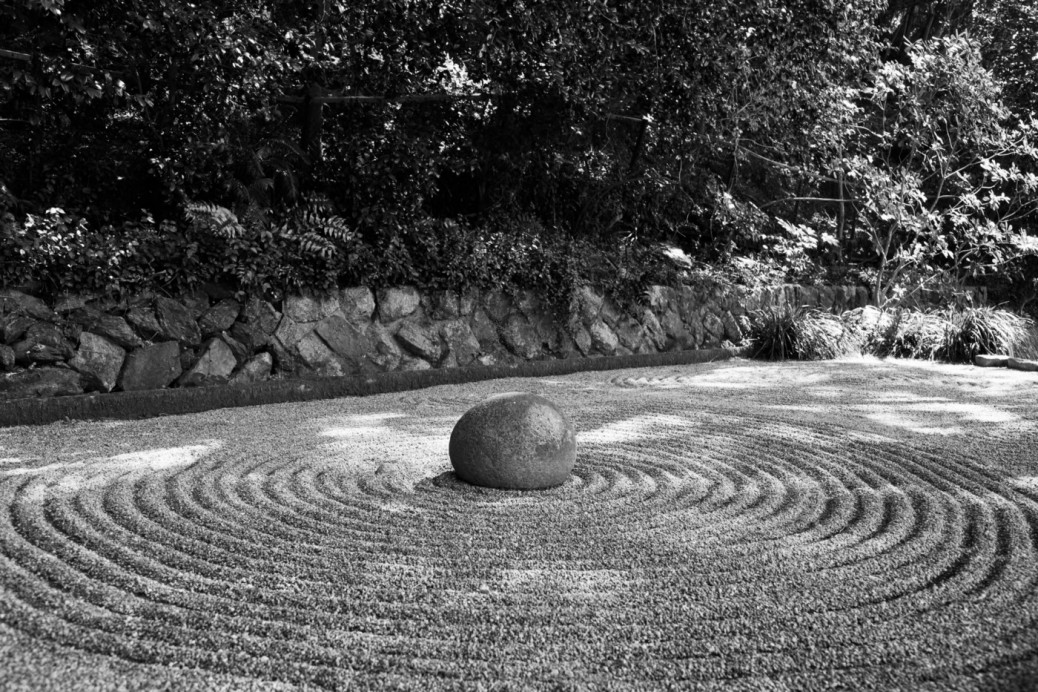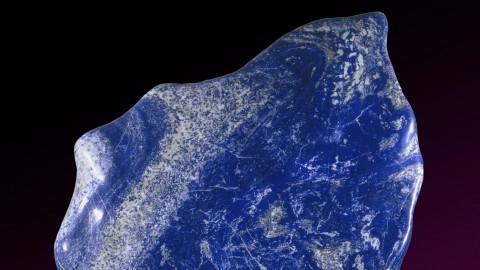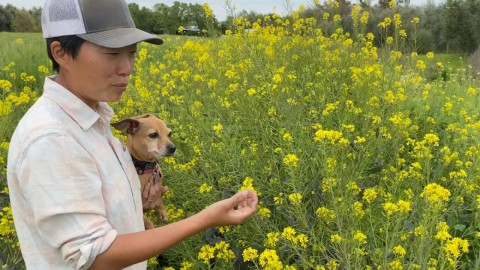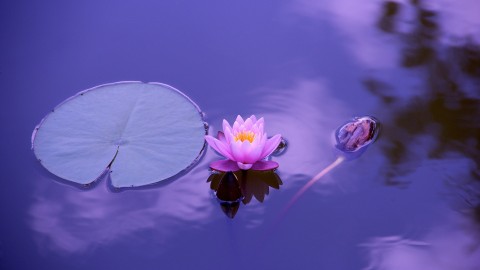Now let me tell you one very basic yoga structure of your being.
Just as physicists think that the whole consists of nothing but electrons, electric energy, yoga thinks that the whole consists of nothing but sound electrons. The basic element of existence for yoga is sound because life is nothing but a vibration. Life is nothing but an expression of silence. Out of silence we come and into silence we dissolve again. Silence, space, nothingness, nonbeing, is your innermost core, the hub of the wheel. Unless you come to that silence, to that space where nothing else remains except your pure being, liberation is not attained. This is the yoga framework.
They divide your being into four layers. I am speaking to you; this is the last layer. Yoga calls it vaikhari; the word means “fruition,” flowering. But before I speak to you, before I utter something, it becomes manifest to me as a feeling, as an experience; that is the third stage. Yoga calls it MADHYAMA, “the middle.” But before something is experienced inside, it moves in a seed form. You cannot experience it ordinarily unless you are very meditative, unless you have become so totally calm that even a stirring in the seed which has not sprouted yet can be perceived; it is very subtle. Yoga calls that pashyanti; the word pashyanti means “looking back,” looking to the source. And beyond that is your fundamental being out of which everything arises. That is called para; para means “the transcendental.”
Now try to understand these four layers. Para is something beyond all manifestation.
Pashyanti is like a seed. Madhyama is like a tree. Vaikhari is like fruition, flowering.
Let me tell you another story, again from the Chandogya Upanishad.
“Fetch me from thence a fruit of the nyagrodha tree,” asked the father, the great sage Uddalak, to his son.
“Here is one, sir,” said Svetaketu.
“Break it.”
“It is broken, sir.”
“What do you see there?”
“These seeds, almost infinitesimal.” “Break one of them.”
“It is broken, sir.”
“What do you see?”
“Nothing, sir. Absolutely nothing.”
The father said, “My son, that subtle essence which you do not perceive there, of that very essence this great nyagrodha tree exists. Believe it, my son, that there is the subtle essence in that all things have existence. That is the truth. That is the self. And that, Svetaketu, that art thou – tatvamasi, Svetaketu.”
The nyagrodha tree, a big tree. The father asks for a fruit; Svetaketu brings it. Fruit is vaikhari – the thing has flowered, fruition has happened. Fruit is the most peripheral thing, absolutely manifested. The father says, “Break it.” Svetaketu breaks it – millions of seeds. The father says, “Choose one seed. Break it also.” He breaks that seed also.
Now there is nothing in hand. Now inside the seed there is nothing. Uddalak says, “Out of this nothingness comes the seed. Out of the seed comes the tree. Out of the tree comes the fruit. But the basis is nothingness, the silence, the space, the formless, the unmanifest, the beyond, the transcendental.”
At the point of vaikhari, you are very much confused because you are farthest from your being. If you move deeper into your being, when you come closer to madhyama, the third point, you will be a little closer to your being. That’s why it is called the middle, the bridge. That’s how a meditator enters into his being. That’s how a mantra is used….
When you use a mantra and you repeat rhythmically “aum, aum, aum…” first it is to be repeated loudly: vaikhari. Then you have to close your lips and you have to repeat it inside – “aum, aum, aum…” – nothing comes out: madhyama. Then you have to drop even repeating inside; it repeats itself. You get in such a tune with it that you drop the repeating and it goes on, on its own accord – “aum, aum, aum….” Now you have become a listener rather than repeating it. You can listen and watch and see: it has become pashyanti. Pashyanti means looking back to the source; now your eyes are turned towards the source. Then by and by that aum also disappears into the formless: suddenly there is emptiness and nothing else. You don’t hear “aum, aum, aum…”; you don’t hear anything.
Neither is there anything heard nor the hearer. Everything has disappeared.
“Tatvamasi, Svetaketu” – Uddalak said to his son, “That art thou.” That nothingness, when the chanter has disappeared and the chanting.
Now if you are too attached to things too much, you will remain at the point of vaikhari. If you are attached to your body too much, you will remain at the point of madhyama. If you are too attached to your mind, too much, you will remain at the point of pashyanti. And if you are not attached at all, suddenly you dissolve into para, the transcendental, the beyond. That’s liberation.
Being liberated means coming back home. We have gone far away. Hmm?… Just see.
Out of nothingness comes the seed, then out of the seed the sprout, then a big tree, then fruits and flowers. How far things have gone. But the fruit falls back into the earth; the circle is complete. Silence is the beginning, silence is the end. Out of pure space we come and into pure space we go. If the circle is not complete, then you will have a being stuck at some point where you have become almost frozen and you cannot move and you have lost the dynamism, the energy, the life.
Yoga wants to make you so alive that you can complete the whole circle, the wheel of life, and you can come to the very beginning again. The end is nothing but the very beginning. The goal is nothing but the source. It is not that we are going to achieve God for the first time. We had him in the first place. We lost him. We will be regaining it, reclaiming it. God is never a discovery; it is always a rediscovery. We have been in him, in that womb of peace and silence and bliss, but we have gone farther away.
It was also part of growth to go far away because if you have never gone out of your home, you will never know what home is. If you have never gone farther away from home, you will never know the beauty, the peace, the comfort, the rest of your home. ‘Come to one’s own home one has to knock at many doors.’ Come back to oneself one has to stumble upon many things. ‘Come to the right path one has to go astray.’
This is necessary, absolutely necessary for growth, but don’t get stuck somewhere. People are stuck. A few people are stuck with their bodies, with their bodily habits. A few people are stuck with their minds, ideologies, thoughts, patterns of dreams.
Says the Katha Upanishad, “Beyond the objects are the senses. Beyond the senses is the mind. Beyond the mind is the intelligence. Beyond the intelligence the soul. Beyond the soul the non manifest. Beyond the non manifest, Brahman. And beyond Brahman himself there is nothing.” This is the end, the pure consciousness.
And this pure consciousness can be achieved through many paths. The real thing is not a path. The real thing is the authenticity of the seeker. Let me emphasize this.
You can travel on any path. If you are sincere and authentic, you will reach the goal.
Some paths may be hard, some may be easier, some may have greenery on both sides, some may be moving through deserts, some may have beautiful scenery around them, some may not have any scenery around them, that’s another thing; but if you are sincere and honest and authentic and true, then each path leads to the goal. Krishna has said in Shrimad Bhagavad Geeta, “Whatever path men travel is my path. No matter where they walk, it leads to me.”
So it simply can be reduced to one thing: that authenticity is the path. No matter what path you follow, if you are authentic, every path leads to him. And the opposite is also true: no matter what path you follow, if you are not authentic, you will not reach anywhere. Your authenticity brings you back home, nothing else. All paths are just secondary. The basic thing is to be authentic, to be true.
There is a Sufi story:
A man heard that if he went to a certain place in the desert at dawn and stood facing a distant mountain, his shadow would point to a great buried treasure. The man left his cabin before the first light of day and at dawn was standing in the designated place. His shadow shot out long and thin over the surface of the sand. “How fortunate,” he thought as he envisioned himself with great wealth. He began digging for the treasure. He was so involved with his work that he did not notice the sun climbing in the sky and shortening his shadow, and then he noticed it. It was now almost half of the previous size. He became worried and started digging again in the new spot. Hours later, at noon, the man again stood in the designated spot. He cast no shadow. He became very much worried.
He started crying and weeping – the whole effort was lost. Now where is the place?
Then there passed a Sufi Master, who started laughing at him and said, “Now exactly the shadow is pointing to the treasure. It is within you.”
All paths can lead to it because in a way it is already achieved. It is within you. You are not seeking something new. You are seeking something which you have forgotten. And how can you really forget it? That’s why we go on searching for bliss, because we cannot forget it. It goes on resounding inside us. The search for bliss, the search for joy, the search for happiness is nothing but the search for God. You may not have used the word “God,” that doesn’t matter, but all searching for bliss is the search for God – is the search for something that you knew, that one day was yours and you lost.
That’s why all the great saints have said “remember.” Buddha calls it SAMYAK SMRITI, “right remembrance.” Nanak calls it NAM SMARAN, “remembering the name” – remembering the address. Have you not observed many times it happens? You know something, you say, “It is exactly on the tip of my tongue,” but still it is not coming. God is at the tip of your tongue.
In a small school the chemistry teacher wrote a formula on the blackboard, and he asked a small boy to stand up and tell him what this formula represents. The boy looked, and he said, “Sir, it is just on the tip of my tongue, but I cannot remember.”
The teacher said, “Spit it out! Spit it out! It is potassium cyanide!”
God is also on the tip of the tongue, and I will tell you, “Swallow it! Swallow it! Don’t spit it out! It is God!” Let him circulate in your blood. Let him become part of your innermost vibrations. Let him become a song inside your being, a dance.
The identification with the body is nothing but a habit. When a child is born, he does not know who he is, and the parents have to create some identity; otherwise he will be lost in the world. They have to tell him who he is. They also don’t know. They have to create a false label. They give him a name, they give him a mirror, and they tell him, “Look. This is your face. Look. This is your name. Look. This is your home. Look. This is your caste, your religion, your country.” These identifications help him to feel who he is – without knowing who he is. These are habits.
Then by and by his mind starts developing. If he is born in a Hindu home, he reads the Geeta, listens to the Geeta. If in a Christian home, he is brought to the church. A new identity starts, an innermost identity – he becomes a Christian, a Hindu, a Mohammedan.
If he is born in India, he becomes an Indian. In China, he becomes Chinese. And he starts identifying himself with the tradition of the country. A Chinese person identifies himself with Chinese tradition and history, the past of China. Then one feels at home, one has roots – the whole tradition. If one is Indian, one has roots, one is not a vagabond. One has created a certain home: in the tradition, in the country, in the history, in the heroes – Ram, Krishna – now one feels at home. One has found his place, but that is not a real place. This identity is utilitarian.
And then this habit becomes so solid that even one day you come to know what nonsense it is that you think you are Indian, Hindu, Mohammedan, Christian, Chinese – what nonsense – but then too the old habit will persist.
Tags: Authenticity Is The Path Patanjali










